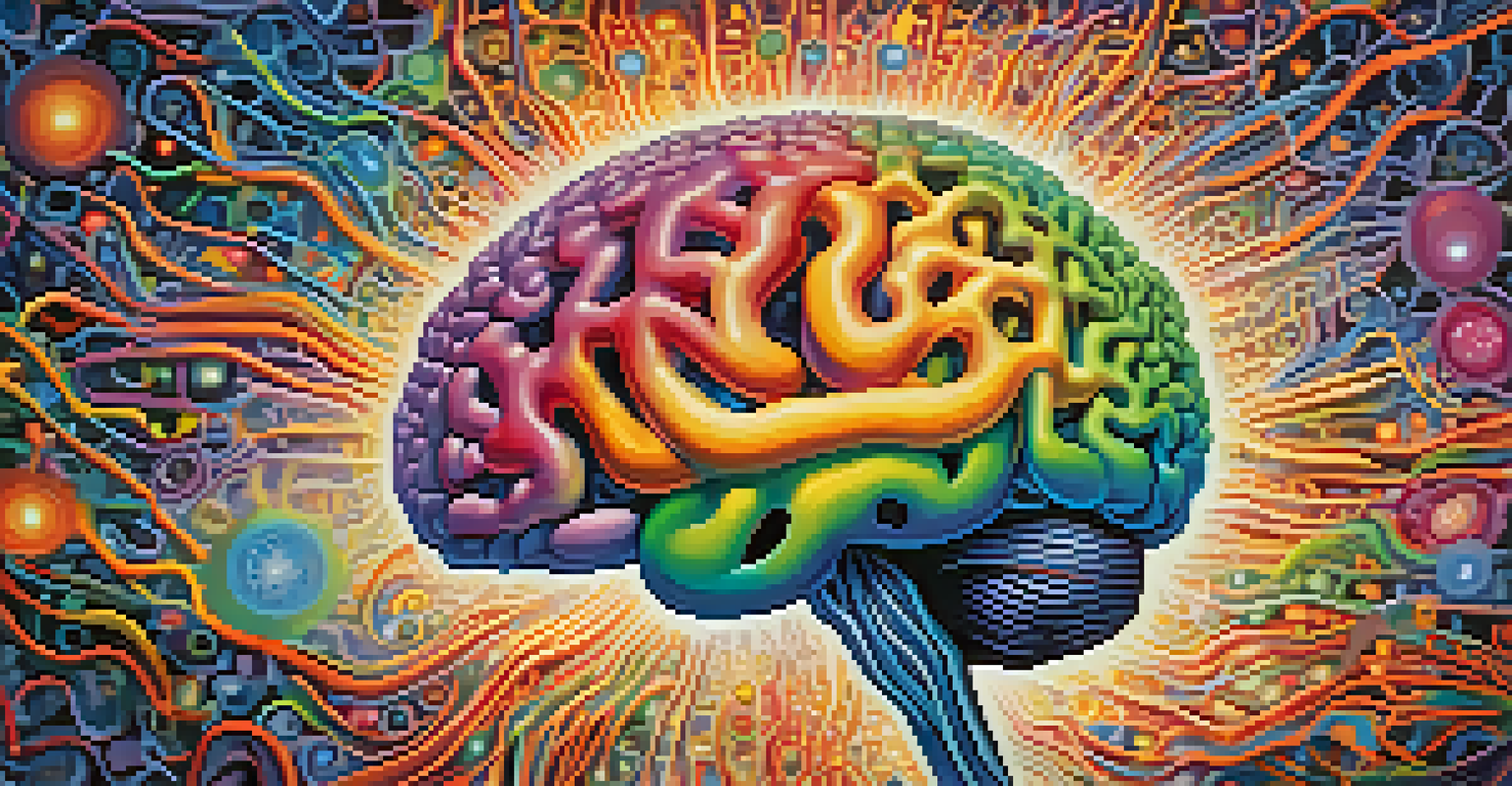Exploring Hallucinogens: Effects, Risks, and Societal Views

Understanding Hallucinogens: What Are They?
Hallucinogens are substances that alter perception, mood, and cognitive processes. Common examples include LSD, psilocybin (found in magic mushrooms), and mescaline. These substances can lead users to experience vivid hallucinations, where they see, hear, or feel things that aren’t there.
The mind is everything. What you think you become.
Historically, hallucinogens have been used in various cultures for spiritual and medicinal purposes. For instance, indigenous tribes have utilized peyote in religious ceremonies for centuries. Today, interest in these substances is resurging, particularly for potential therapeutic uses.
Understanding what hallucinogens are is the first step in exploring their broader implications. As research progresses, many are curious about how these substances affect the brain and our perceptions of reality.
How Hallucinogens Affect the Brain and Body
When consumed, hallucinogens interact with neurotransmitters in the brain, particularly serotonin. This interaction can lead to altered sensory perception, emotional shifts, and changes in thought processes. Users may feel a sense of euphoria or experience profound insights, but these effects can vary widely.

In addition to the psychological effects, hallucinogens can also have physical consequences. These might include elevated heart rates, dilated pupils, and changes in body temperature. While some effects are temporary, others may linger, leading to unexpected challenges.
Hallucinogens: Effects on Mind and Body
Hallucinogens interact with brain neurotransmitters, leading to altered perceptions and emotional shifts while also presenting physical risks.
It’s crucial to recognize that the experience of hallucinogens is highly subjective. Factors such as set (mindset) and setting (environment) play significant roles in shaping an individual’s experience, highlighting the need for caution.
Potential Therapeutic Uses of Hallucinogens
Recent studies have shown promising results for the therapeutic use of hallucinogens in treating conditions like PTSD, depression, and anxiety. Researchers are exploring how substances like psilocybin can help reset neural circuits in the brain, allowing for healthier emotional processing.
Psychedelics can help us explore our own consciousness, opening doors to insights that can lead to healing.
For example, a study revealed that patients with severe depression experienced significant relief after just a few sessions involving psilocybin. This suggests that hallucinogens could potentially offer new avenues for mental health treatment.
While the findings are encouraging, more research is needed to fully understand the long-term effects and efficacy. As the stigma around these substances decreases, the medical community is becoming increasingly open to exploring their potential benefits.
Risks and Side Effects of Hallucinogen Use
Despite their potential benefits, hallucinogens come with risks that users should be aware of. Unpredictable effects, such as anxiety or paranoia, can occur, especially in unfamiliar settings. Additionally, there’s the potential for ‘bad trips’ that can leave lasting psychological impacts.
Physical risks also exist, particularly when substances are used irresponsibly. Hallucinogens can impair judgment, leading to risky behaviors, and in some cases, individuals may inadvertently harm themselves or others while under the influence.
Therapeutic Potential of Hallucinogens
Emerging research indicates that hallucinogens like psilocybin may offer new treatment avenues for conditions such as PTSD and depression.
It’s essential for users to approach these substances with caution and respect. Understanding both the positive and negative aspects of hallucinogen use helps equip individuals with the knowledge they need to make informed decisions.
Societal Views on Hallucinogens: A Changing Landscape
Societal views on hallucinogens have shifted significantly over the decades. Once strictly associated with counterculture movements, they are now being re-evaluated in light of emerging research. This change has sparked discussions about legal reform and the potential for regulated therapeutic use.
Many advocates argue that hallucinogens should be decriminalized to allow for further study and to reduce the stigma surrounding their use. This perspective is gaining traction, especially as more evidence emerges supporting their therapeutic benefits.
As public perception evolves, it's important to continue fostering informed conversations about hallucinogens. By addressing both the risks and potential benefits, society can better navigate the complexities these substances present.
The Role of Education in Hallucinogen Awareness
Education plays a critical role in shaping public understanding of hallucinogens. Comprehensive educational programs can help dispel myths and provide accurate information about the effects and risks associated with these substances. Knowledge empowers individuals to make safer choices.
Schools, community organizations, and healthcare providers can contribute to this educational effort. By offering resources and support, they can help create a more informed public that understands both the potential benefits and dangers of hallucinogens.
Changing Views on Hallucinogens
Societal perceptions of hallucinogens are evolving, prompting discussions about their decriminalization and potential for regulated therapeutic use.
Moreover, ongoing dialogue about hallucinogens can foster a culture of safety and responsibility. By prioritizing education, we can encourage individuals to engage with these substances thoughtfully and responsibly.
The Future of Hallucinogen Research and Policy
The future of hallucinogen research is promising, with a growing number of studies exploring their therapeutic potential. As more data becomes available, it may lead to changes in policy that could facilitate access to these substances for medical use. This could mark a significant shift in how society views and utilizes hallucinogens.
Additionally, as researchers uncover more about the mechanisms and effects of hallucinogens, we may see an increase in tailored treatments designed for specific conditions. This could provide new hope for those struggling with mental health issues.

Ultimately, the path forward requires a balanced approach that respects both the risks and benefits of hallucinogens. Continued research, combined with informed policy decisions, will be key in shaping the future landscape of hallucinogen use in society.